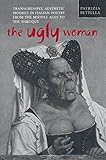The Ugly Woman : Transgressive Aesthetic Models in Italian Poetry from the Middle Ages to the Baroque / Patrizia Bettella.
Material type: TextSeries: Toronto Italian StudiesPublisher: Toronto : University of Toronto Press, [2005]Copyright date: ©2005Description: 1 online resource (270 p.)Content type:
TextSeries: Toronto Italian StudiesPublisher: Toronto : University of Toronto Press, [2005]Copyright date: ©2005Description: 1 online resource (270 p.)Content type: - 9780802039262
- 9781442682481
- 851.009/3522
- PQ4055.W6
- online - DeGruyter
| Item type | Current library | Call number | URL | Status | Notes | Barcode | |
|---|---|---|---|---|---|---|---|
 eBook
eBook
|
Biblioteca "Angelicum" Pont. Univ. S.Tommaso d'Aquino Nuvola online | online - DeGruyter (Browse shelf(Opens below)) | Online access | Not for loan (Accesso limitato) | Accesso per gli utenti autorizzati / Access for authorized users | (dgr)9781442682481 |
restricted access online access with authorization star
http://purl.org/coar/access_right/c_16ec
The ugly woman is a surprisingly common figure in Italian poetry, one that has been frequently appropriated by male poetic imagination to depict moral, aesthetic, social, and racial boundaries. Mostly used between the thirteenth and seventeenth centuries - from the invectives of Rustico Filippi, Franco Sacchetti, and Burchiello, to the paradoxical praises of Francesco Berni, Niccolò Campani and Pietro Aretino, and further to the conceited encomia of Giambattista Marino and Marinisti - the portrayal of female unattractiveness was, argues Patrizia Bettella in The Ugly Woman, one way of figuring woman as 'other.'Bettella shows how medieval female ugliness included transgressive types ranging from the lustful old hag, to the slanderer, the wild woman, the heretic/witch, and the prostitute, whereas Early Modern unattractiveness targeted peasants, mountain dwellers, and black slaves: marginal women whose bodies and manners subvert aesthetic precepts of culturally normative beauty and propriety. Taking a philological and feminist approach, and drawing on the Bakhtinian concept of the grotesque body and on the poetics of transgression, The Ugly Woman is a unique look at the essential counterdiscourse of the celebrated Italian poetic canon and a valuable contribution to the study of women in literature.
Mode of access: Internet via World Wide Web.
In English.
Description based on online resource; title from PDF title page (publisher's Web site, viewed 01. Nov 2023)


